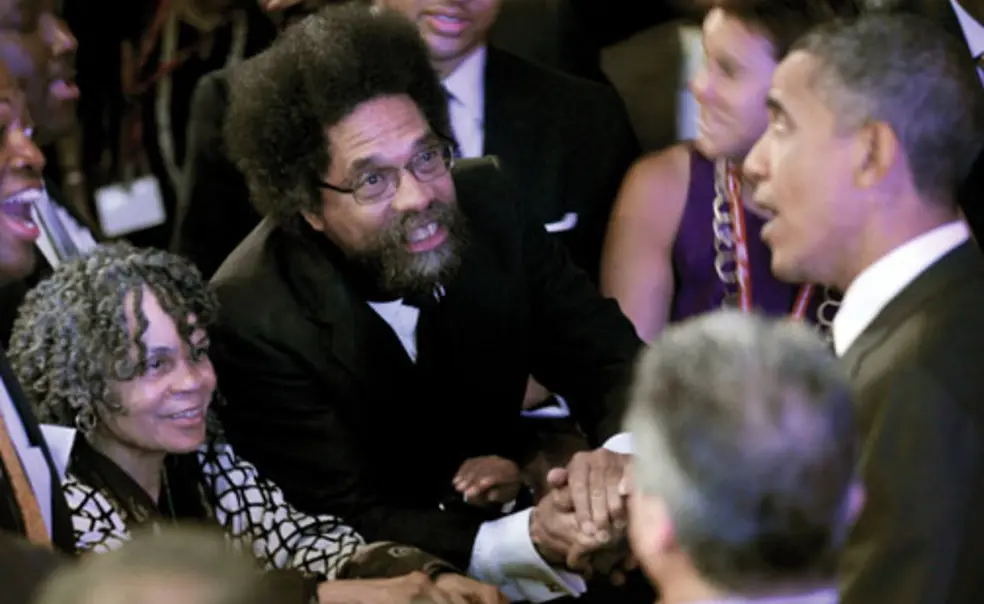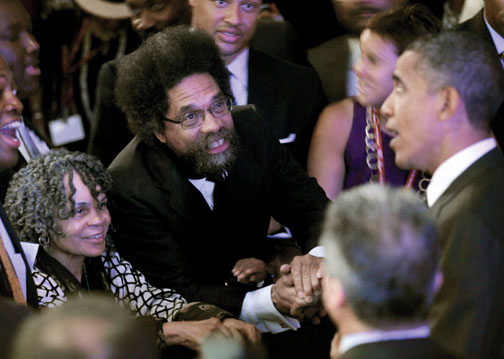West *80's views on Obama stir black-community debate
Cornel West *80 is no stranger to criticism. Yet West says that even he was caught off guard by the response to his recent remarks about President Barack Obama — comments that placed Princeton faculty members at the center of a debate over whether the president has catered to Wall Street over working-class Americans.
In an interview with Chris Hedges posted May 16 on the website TruthDig, West said Obama has been “a black mascot of Wall Street oligarchs and a black puppet of corporate plutocrats.” Though the White House did not respond to West’s comments, they triggered a fierce debate in the African-American community, not as much over the substance of West’s policy critique as over the personal terms in which he framed it.
West’s critique undoubtedly was harsh but hardly new. Berkeley economist Robert Reich has offered similar criticism, and West himself expressed the same view but with less rancor soon after Obama took office. This time, though, West took heat for personal remarks and for comments suggestive of psychological analysis — for example, his conclusion that the president “has a certain fear of free black men,” due, West speculated, to his mixed-race parentage and his upbringing by white grandparents in Kansas. “All he has known culturally is white,” West said.
West’s comments drew widespread attention and analysis, in black communities and major newspapers like The Boston Globe and The Washington Post, on television and radio talk shows, by tweeting academics, and especially on black websites like the Grio and the Root. Some thought West was naïve to expect Obama to be a revolutionary rather than a politician, while others pointed out that he is the president of the entire nation, not just of black America. Others took West’s side, arguing that the professor was speaking the truth about a president who was a pragmatic centrist, not a true progressive.
One of West’s most unsparing critics was his Princeton colleague Melissa Harris-Perry, who wrote in The Nation: “In a self-aggrandizing, victimology sermon deceptively wrapped in the discourse of prophetic witness, Professor West offers thin criticism of President Obama and stunning insight into the delicate ego of the self-appointed black leadership class that has been largely supplanted in recent years.”
Harris-Perry, a professor of politics and African-American studies who left Princeton for Tulane University July 1, argued that West’s “sense of betrayal is clearly more personal than ideological.” (West said he felt disrespected and unappreciated by the president, and was not given tickets to the inauguration despite making 65 appearances for candidate Obama. He also described bitterly the scolding Obama gave him after a National Urban League speech last July for insisting that the president was not a true progressive.)
Watching this exchange were other black intellectuals. At Brown, economist Glenn Loury said he was taken aback by Harris-Perry’s tone: “As a put-down, it was really very rough.” Loury had been thinking about defending West — or at least the policy part of his comments — in an op-ed for The New York Times. “The ship of state continues to go in the same problematic direction, but now with a black face at the helm,” he explained. But when Loury read West’s complete remarks, he decided he could not endorse them.
West was not taking anything back, though he did say that it was a tactical mistake to mix his personal hurt with his policy criticism. “[Commentators] jump on the personal stuff, and the poor and working people are again rendered invisible, given the sensationalized aspects of the personal,” West told PAW. “This was a kind of two-dimensional dialogue, and only one dimension gets highlighted.”
Eddie Glaude *97, the head of Princeton’s Center for African American Studies and a friend of West, seemed uncomfortable with some of the personal aspects of West’s comments, but saw the debate as a distraction from the suffering of poor and working people and as “part of the neoliberal containment of race in the United States.”
“We can’t talk about race in the public domain without fearing the kind of counterclaim that we’re engaging in reverse racism,” Glaude told radio host Sam Seder. “So there’s this two-sided argument going on: On one hand, there’s a kind of, ‘Look, well, he’s our first black president. We don’t need to be complicitous in all this racist critique coming at him. We need to surround him and protect him. We know he can’t do much.’ Then there’s the other side, when people say, ‘What are we to do about black suffering in this country?’ So what you get is this very interesting containment.”
In an interview with Chris Hedges posted May 16 on the website TruthDig, West said Obama has been “a black mascot of Wall Street oligarchs and a black puppet of corporate plutocrats.” Though the White House did not respond to West’s comments, they triggered a fierce debate in the African-American community, not as much over the substance of West’s policy critique as over the personal terms in which he framed it.
West’s critique undoubtedly was harsh but hardly new. Berkeley economist Robert Reich has offered similar criticism, and West himself expressed the same view but with less rancor soon after Obama took office. This time, though, West took heat for personal remarks and for comments suggestive of psychological analysis — for example, his conclusion that the president “has a certain fear of free black men,” due, West speculated, to his mixed-race parentage and his upbringing by white grandparents in Kansas. “All he has known culturally is white,” West said.
West’s comments drew widespread attention and analysis, in black communities and major newspapers like The Boston Globe and The Washington Post, on television and radio talk shows, by tweeting academics, and especially on black websites like the Grio and the Root. Some thought West was naïve to expect Obama to be a revolutionary rather than a politician, while others pointed out that he is the president of the entire nation, not just of black America. Others took West’s side, arguing that the professor was speaking the truth about a president who was a pragmatic centrist, not a true progressive.
One of West’s most unsparing critics was his Princeton colleague Melissa Harris-Perry, who wrote in The Nation: “In a self-aggrandizing, victimology sermon deceptively wrapped in the discourse of prophetic witness, Professor West offers thin criticism of President Obama and stunning insight into the delicate ego of the self-appointed black leadership class that has been largely supplanted in recent years.”
Harris-Perry, a professor of politics and African-American studies who left Princeton for Tulane University July 1, argued that West’s “sense of betrayal is clearly more personal than ideological.” (West said he felt disrespected and unappreciated by the president, and was not given tickets to the inauguration despite making 65 appearances for candidate Obama. He also described bitterly the scolding Obama gave him after a National Urban League speech last July for insisting that the president was not a true progressive.)
Watching this exchange were other black intellectuals. At Brown, economist Glenn Loury said he was taken aback by Harris-Perry’s tone: “As a put-down, it was really very rough.” Loury had been thinking about defending West — or at least the policy part of his comments — in an op-ed for The New York Times. “The ship of state continues to go in the same problematic direction, but now with a black face at the helm,” he explained. But when Loury read West’s complete remarks, he decided he could not endorse them.
West was not taking anything back, though he did say that it was a tactical mistake to mix his personal hurt with his policy criticism. “[Commentators] jump on the personal stuff, and the poor and working people are again rendered invisible, given the sensationalized aspects of the personal,” West told PAW. “This was a kind of two-dimensional dialogue, and only one dimension gets highlighted.”
Eddie Glaude *97, the head of Princeton’s Center for African American Studies and a friend of West, seemed uncomfortable with some of the personal aspects of West’s comments, but saw the debate as a distraction from the suffering of poor and working people and as “part of the neoliberal containment of race in the United States.”
“We can’t talk about race in the public domain without fearing the kind of counterclaim that we’re engaging in reverse racism,” Glaude told radio host Sam Seder. “So there’s this two-sided argument going on: On one hand, there’s a kind of, ‘Look, well, he’s our first black president. We don’t need to be complicitous in all this racist critique coming at him. We need to surround him and protect him. We know he can’t do much.’ Then there’s the other side, when people say, ‘What are we to do about black suffering in this country?’ So what you get is this very interesting containment.”













No responses yet